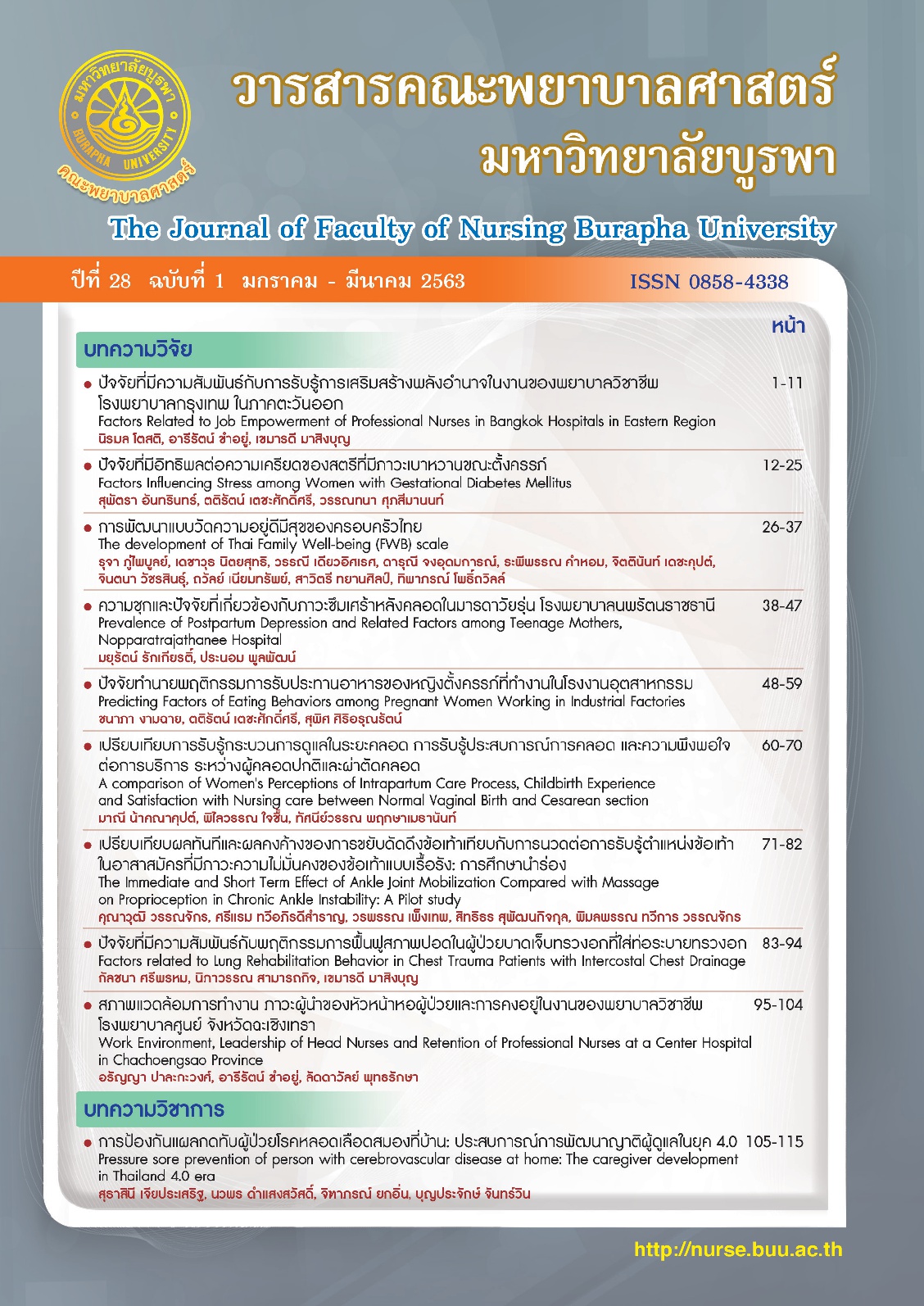ปัจจัยที่มีความสัมพันธ์กับการรับรู้การเสริมสร้างพลังอำนาจในงานของพยาบาลวิชาชีพโรงพยาบาลกรุงเทพ ในภาคตะวันออก
คำสำคัญ:
การเสริมสร้างพลังอำนาจในงาน, ภาวะผู้นำการเปลี่ยนแปลง, สภาพแวดล้อมในการทำงาน, พยาบาลวิชาชีพบทคัดย่อ
บทคัดย่อ
การวิจัยนี้มีวัตถุประสงค์เพื่อศึกษาความสัมพันธ์ระหว่างภาวะผู้นำการเปลี่ยนแปลง สภาพแวดล้อมในการทำงาน กับการรับรู้เสริมสร้างพลังอำนาจในงานของพยาบาลวิชาชีพ โรงพยาบาลกรุงเทพ ในภาคตะวันออก กลุ่มตัวอย่างเป็นพยาบาลวิชาชีพที่ปฏิบัติงานประจำในโรงพยาบาลกรุงเทพ ภาคตะวันออก จำนวน 84 คน โดยการสุ่มแบบหลายขั้นตอน เก็บรวบรวมข้อมูลระหว่างเดือนกุมภาพันธ์ถึงเดือนมีนาคม พ.ศ. 2562 เครื่องมือวิจัยประกอบด้วยแบบบันทึกข้อมูลทั่วไป แบบสอบถามภาวะผู้นำการเปลี่ยนแปลง แบบสอบถามการประเมินสภาพแวดล้อมในการทำงาน และแบบสอบถามการรับรู้การเสริมสร้างพลังอำนาจในงาน มีค่าความเที่ยงสัมประสิทธิ์แอลฟาของครอนบาค ที่ .97, .88 และ .96 ตามลำดับ วิเคราะห์ข้อมูลโดยใช้สถิติพรรณนา และวิเคราะห์สัมประสิทธิ์สหสัมพันธ์แบบเพียร์สัน
ผลการวิจัยพบว่า พยาบาลวิชาชีพมีคะแนนเฉลี่ยโดยรวมของการรับรู้ภาวะผู้นำการเปลี่ยนแปลงของหัวหน้าแผนก สภาพแวดล้อมในการทำงาน และการรับรู้การเสริมสร้างพลังอำนาจในงานของพยาบาลวิชาชีพ อยู่ในระดับสูง (M = 4.13, SD = 0.57; M = 3.92, SD = 0.46; M = 3.84, SD = 0.66 ตามลำดับ) และพบว่าสภาพแวดล้อมในการทำงาน และภาวะผู้นำการเปลี่ยนแปลง มีความสัมพันธ์ทางบวกในระดับสูง กับการรับรู้การเสริมสร้างพลังอำนาจในงานของพยาบาลวิชาชีพในโรงพยาบาลกรุงเทพ ภาคตะวันออก อย่างมีนัยสำคัญทางสถิติ (r = .797, p < .01 และ r = .735, p < .01 ตามลำดับ) ผลการวิจัยเสนอแนะว่า ผู้บริหารทางการพยาบาลควรพัฒนาผู้บริหาร ระดับหัวหน้าแผนกให้มีภาวะผู้นำการเปลี่ยนแปลงมากขึ้น จัดสภาพแวดล้อมให้เอื้อต่อการทำงาน รวมถึงการเพิ่มการเสริมสร้างพลังอำนาจในงานพยาบาลวิชาชีพ
เอกสารอ้างอิง
Organization Excellence. Journal of Applied Environmental and Biological Sciences, 5(5s), 180-190
Aiken, L.H., & Patrician PA. (2000). Measuring organizational traits of hospitals: the
Revised nursing Work Index. Nursing Research, 49(3), 146–153.
Aon Hewitt Thailand. (2017). Employee engagement and empowerment survey 2017: Bangkok Dusit Medical Services (BDMS), Group 3. From https://www.matchlink.asia/th/
Chairit, P. (2015). Factors influencing the Work Happiness of registered nurses in
community hospitals, in Eastern Region. The Journal of Factory of Nursing Burapha University, 23(1), 25- 58. [In Thai]
Kanter, R. M. (1977). Men and Women of the Corporation. New York: Basic Books
Klakovich, M. D. (1994). Connective leadership for the 21st Century: A historical
perspective and future directions. Advances in Nursing Science, 16(4), 42-54.
Laschinger, H. K. S., Almost, J, Tuer-Hodes, D. (2003). Workplace empowerment and
magnet hospital characteristics: making the link. Journal of Nursing Administration, 33(7-8), 410-422.
Mawatchara, N. (2002). Relationships between head nurses leadership with job empowerment of registered nurses in community Hospitals Samutprakarn Province. Chonburi Hospital Journal, 27(3), 55-63. [In Thai]
Perm-adchariya, L. (2007). A relationship between selected factors and empowerment of professional nurses in accredited community hospitals in Lower Northern Region. Saraburi Hospital Medical Journal, 32(1), 33-41. [In Thai]
Promsaard, U. (2013). An empowerment of work influencing the job competency of registered nurses private hospital, Bangkok metropolis. Journal of Public Health, 42(2), 92-102. [In Thai]
Rungwachira, O. (2004). Relationships between transformational leadership and quality development activities of head nurses as perceived by staff nurses. Chonburi Hospital Journal, 29(3),155-163.
Sintusen, S. (2009). Relationships between work attitude, psychological empowerment of head Nurses and professional nurses’ self-concept in private hospital, Southern Region. JNSCU, 21(1), 103-115. [In Thai]
Smith, N. J. (2014). Nursing and change: Is it time to visit empowerment?.
International Journal of Nursing Sciences, 1, 134-136.
Thanakarn, N. (2010). Nurses’ job satisfaction at Bumrungrad International Hospital. Journal of Health and Nursing Research, 26(2), 30-36. [In Thai]
Tuanyee, S. (2013). Relationships between transformational leadership and job empowerment of head nurses as perceived by staff nurses in Sakonnakhon hospital. Journal of Sakonnakhon Hospital,19(3), 31-39. [In Thai]
Twigg, D., & McCullough, K. (2014). Nurse retention: A review of strategies to create
and enhance positive practice environments in clinical settings. International Journal of Nursing Studies, 51(1), 85-92.
Vetayavetin, S. (2012). Relationships between empowerment, work itself and work engagement of professional nurses in Private Hospitals. JNSCU, 24(2), 41-53. [In Thai]
Wilson, B., & Laschinger,H.K. (1994). Staff nurse perception of job empowerment
and organizational commitment: A test kanter’s theory of structural power in organization. Journal of Nursing Administration, 24(4), 39-47.
Worrakanong, M. (2006). Relationships between work environment, job empowerment and job satisfaction of professional nurses in community hospitals, Chantaburi province. The Journal of Prapokklao Hospital Clinical Medical, 23(3), 82-89. [In Thai]





